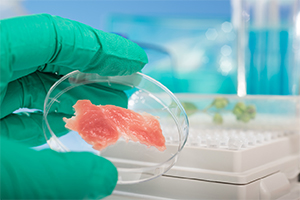 Recent environmental and political events have highlighted the need for sustainable foods. Producing foods, fibers, and other plant and animal products using farming and production techniques that protect the environment, public health, and animal welfare has become a hot button issue for many Americans. We see the label bandied about a lot regarding fish, grains, and produce, but there is also a lot of concern regarding the sustainable production of meat.
Recent environmental and political events have highlighted the need for sustainable foods. Producing foods, fibers, and other plant and animal products using farming and production techniques that protect the environment, public health, and animal welfare has become a hot button issue for many Americans. We see the label bandied about a lot regarding fish, grains, and produce, but there is also a lot of concern regarding the sustainable production of meat.
To raise animals like cows, pigs, and chickens for the purposes of producing beef, pork, and chicken destined for grocery stores and restaurants uses a considerable amount of resources, including land, water, energy, labor, and feed. United Nations scientists have stated that raising animals for food is one of the world’s most pressing environmental problems.
This is where science and technology have entered the food industry to help create a method to produce meat in a more sustainable way. Enter ‘clean meat.’ Clean meat, or cultured meat as it’s sometimes called, tastes just like traditional meat. That’s because it is animal protein, it just isn’t grown on an animal. A small amount of animal cells are harvested, then replicated in a laboratory. Growing animal cells in a lab has many advantages to the traditional methods of livestock farming and eliminates most of the food safety concerns that continue to plague our food industry. There are fewer concerns for bacterial contamination from livestock farms and slaughterhouses, as well as no need for antibiotics often used to prevent diseases among farm animals. In addition, producing meat in a lab rather than on a farm contributes to less land degradation, less air and water pollution, and less animal suffering.
Several companies are competing to be on the forefront of the clean meat revolution to reduce the amount of resources needed to create animal protein in a more sustainable and environmentally friendly way. JUST, a California based company known for its innovative products, is using cell technology to grow animal protein in a lab. His company’s chicken and chicken nuggets may hit the consumer market sooner than you may think. “I’d like to think it will be before the end of 2018,” JUST CEO Josh Tetrick predicted. He speculates that consumers may see his clean meat at a restaurant before they see it in the grocery store due to regulatory hurdles.
Will bariatric patients be ready to try clean meat when it becomes widely available? Protein is the foundation of the post bariatric surgery diet, which puts gastric sleeve, gastric bypass, and lap band patients in a unique position to be on the forefront of this sustainable food revolution. Gastric sleeve, gastric bypass, and lap band patients are encouraged to eat 60 to 80 grams of protein per day, always choosing to eat their protein first, then vegetables, then fruits in order to maximize their weight loss after bariatric surgery.
For more information on the post bariatric surgery diet, check out this information from Dr. Shillingford: Click here to schedule your free informational session to learn more about weight loss with gastric sleeve, gastric bypass, and lap band surgery, call Dr. Shillingford’s office at (561) 483-8840. Dr. Shillingford, MD, PA, is a board certified surgeon specializing in advanced laparoscopic and weight loss surgery.

 Am I A Candidate
Am I A Candidate  BMI Calculator
BMI Calculator  Why Choose Us
Why Choose Us